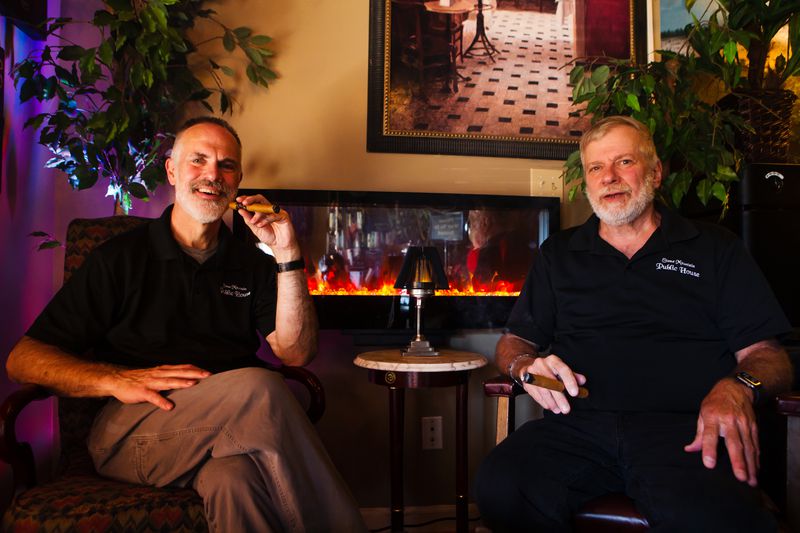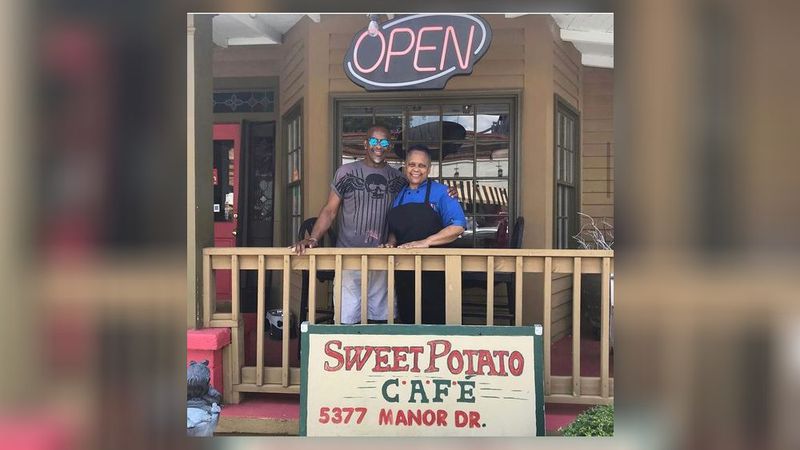
Rory Webb (left) and Jeff Carey (right), owners of Stone Mountain Public House, pose for a portrait on Saturday, January 23, 2021, at Stone Mountain Public House in Stone Mountain, Georgia. Webb and Carey were forced to close Stone Mountain Public House due to the coronavirus pandemic, but are applying for a relief grant to help fund its reopening as a piano bar and cigar lounge. CHRISTINA MATACOTTA FOR THE ATLANTA JOURNAL-CONSTITUTION
By Zachary Hansen
Located along the downtown Stone Mountain strip, a small cigar and piano bar has sat empty for months.
Stone Mountain Public House co-owners Rory Webb and Jeff Carey said their business has been crippled by the COVID-19 pandemic. They’re quickly burning through their life’s savings and revenue has been nonexistent since last October. They’ve even seen the deadly consequences of the virus, which killed one of their lead cooks.
“Our staff was all in favor of not opening just yet,” Webb said. “I think we have enough (money) to get us to April or May, but any assistance we’d be able to get could mean the difference between us still being in business in three months or being another closed business here in town.”
Their business is among the dozens of small brick-and-mortar stores that desperately need financial assistance in one of DeKalb County’s tiniest cities. On Tuesday, Stone Mountain began to answer that call for relief.

Rory Webb and Jeff Carey, owners of Stone Mountain Public House, pose for a portrait on Saturday, January 23, 2021, at Stone Mountain Public House in Stone Mountain, Georgia. Webb and Carey were forced to close Stone Mountain Public House due to the coronavirus pandemic, but are applying for a relief grant to help fund its reopening as a piano bar and cigar lounge. CHRISTINA MATACOTTA FOR THE ATLANTA JOURNAL-CONSTITUTION
The city will use its own money to launch its own pandemic relief grant program next month that will divvy up $250,000 between dozens of small businesses and nonprofits. City leaders decided the need for relief was great enough to justify dipping into the city’s own general budget funds to help out its small business owners.
City Manager ChaQuias Miller-Thornton said the city is footing the bill for the program after seeing the need in the community, which consists of fewer than 6,300 residents.
The city’s grants are being offered on top of earlier federal relief money that some businesses obtained.
“We saw the ramifications of what the pandemic was doing to our community, which of course had some negative economic effects on our businesses and constituents” she said.
Stone Mountain, like all of DeKalb’s 12 cities, received federal coronavirus relief funds last year through the Coronavirus Aid, Relief and Economy Security (CARES) Act to combat the effects of the pandemic. Stone Mountain received about $712,000, which went toward city building improvements and payroll expenses for first responders.
The land within Stone Mountain’s city limits is only about 1.7 square miles, so the pandemic’s affects on brick-and-mortar businesses have been pronounced.
Karen Patton, owner of Sweet Potato Cafe, said she’s had to cope with her restaurant’s profits being cut in half since 2019. Her farm-to-table restaurant, which is located a block or so away from Stone Mountain Public House, seats fewer than 50 customers, so the winter months have been particularly harsh for business. A financial boost from the city would greatly help her stay open.
“Anything that we get at this point, it helps,” she said. “It helps keep my doors open for another day or another two weeks or another month. That’s the way I have to look at it.”

Karen Patton, owner and chef at Sweet Potato Cafe in downtown Stone Mountain, said a COVID-19 relief grant would greatly help her business.
The program sets aside $150,000 for brick-and-mortar businesses. Each applicant can receive up to $7,500, which means roughly 20 commercial stores can get full assistance. Nonprofits can receive $62,500 in relief — up to $5,000 per nonprofit. A lottery system will be used if the city receives too many qualifying applications.
Miller-Thornton said roughly half of the city’s business base consists of home-based workers, such as rideshare drivers, microentrepreneurs and gig workers. Since those groups pay $180 annual business license fees like brick-and-mortar stores, she budgeted $37,500 of assistance for that sector with a maximum of $3,000 each.
“Every type of business won’t be fighting for the same pot of money, so we separated it into three separate pots to make it more equitable,” she said.
To qualify, a business must be located in Stone Mountain’s city limits and must have been active before March 14, 2020. In addition, they have to provide evidence of the negative affects the pandemic has had on their revenue. The application period will be Feb. 8-21.
Read the original story on AJC.com.












